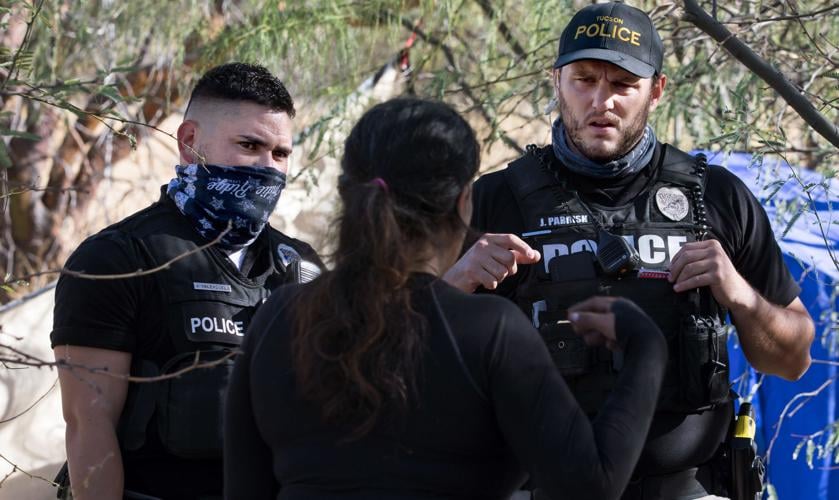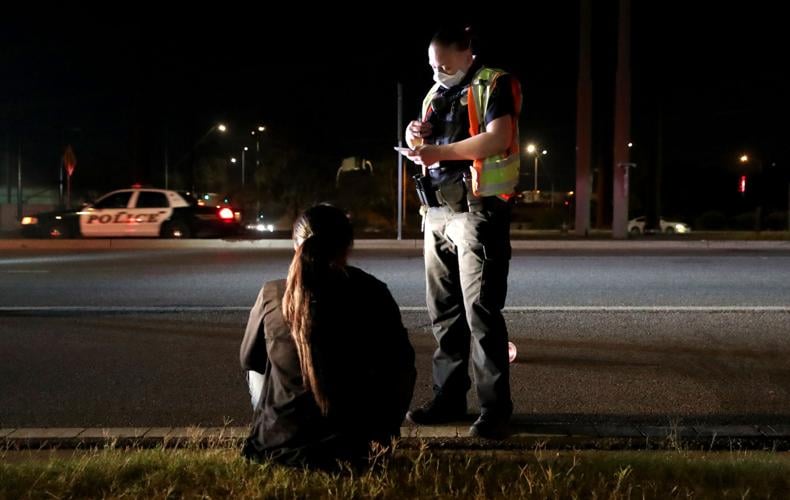Mayor Regina Romero’s security detail will shrink under a Tucson Police Department plan to address a staffing shortage by no longer sending officers to non-urgent calls.
Two full-time members of the team that protects the mayor will return to patrolling the streets when Romero is not at high risk of harm — one of nearly 20 “critical changes” Tucson’s police chief said are necessary to cope with the department’s chronic staffing shortage.
The Oro Valley Police Department conducts periodic high visibility enforcement or HiVE in heavily trafficked corridors, like Oracle Road near Magee Road, to raise driver awareness about issues such as speeding, distracted diving, tailgating and improper use of emergency lanes to bypass others. Video by Kelly Presnell / Arizona Daily Star 2020
Calls TPD will no longer handle include reports of non-criminal homeless activity on public property, minor noise complaints, panhandling, requests for welfare checks and suicidal subjects who are not a threat to others.
Many of those calls will go instead to mobile crisis teams, which are staffed with specialists in mental health, substance abuse or homeless outreach and are funded by state and federal tax dollars.
TPD will continue to respond to calls of any type that involve violence, large, disruptive gatherings or an immediate threat to public safety, Police Chief Chris Magnus said.
The transfer of some police calls to support services is in line with public sentiment favoring a non-police response in non-violent situations, Magnus said. And it’s necessary to ensure enough patrol officers are available to respond to serious threats, he said.
TPD already isn’t responding to many lower-priority calls due to its officer shortage, Magnus said.
“The reality is some of these calls are holding all night. If you call us at 9 p.m. saying your neighbor’s stereo is too loud and we can’t get there until seven the next morning, why are we even going?” he asked rhetorically.
Some of the other call types to be phased out over time include:
- Reports of contraband at schools, hospitals and courts (except firearms.)
- Deaths at medical care facilities.
- Requests for rides to places such as homeless shelters or addiction treatment facilities.
- Reports of city bylaw violations.
- Financial crimes.
- Runaways.
Magnus released the new plan internally last week and has faced questions about whether he did so to pressure city leaders to approve a multi-million-dollar pay raise for his officers.
The chief rejects the suggestion he is trying to force the council’s hand. There’s no need for pressure tactics, he said, because city leaders already know what’s at stake if police officers continue to quit and go elsewhere at the rate they have been.
“I believe they are taking it seriously,” the chief said of his recent presentation to council, which cited a recent study that found TPD officers make an average 13.4% less than surrounding police agencies. It would cost about $10 million a year to make TPD pay rates competitive, he said.
Many Tucson police officers have left for higher pay elsewhere, and the lower wages make it hard to attract new recruits to replace them, the chief said.
In January 2020, the department had 853 sworn officers in its ranks. By this January, the number stood at 813 with officers leaving at the rate of more than eight a month, about twice as many as in previous years, he said.
Even if the council approves a pay raise, it would take up to 18 months for any new TPD hires to be street-ready, Magnus said, so the changes still are necessary to make sure enough patrol officers are available to cover serious crimes.
The mayor, in an email to the Arizona Daily Star, said she agrees with Magnus that many of the calls being phased out “probably never should have had police responses.”
The changes “will free up our police officers to be able to swiftly respond to true emergencies,” Romero said.
She said the city manager is assessing the compensation rates of all city employees to come up with a pay plan that is “fair to all.” It is due to be discussed at an April 6 council meeting.
Romero said she’s OK with the cuts to her security detail.
“She understands the need,” her spokesman Nathaniel Sigal said.
Photos: Memorial service for Tohono O'odham Police Officer Bryan Brown.
Bryan Brown memorial
Updated
The ceremonial flag is folded over the remains of Tohono O'odham Police officer Bryan Brown as hundreds of law enforcement from throughout the state gather at the Desert Diamond Casino Sahuarita for his memorial service Sahuarita, Ariz., September 12, 2020. Several hundred attended the three hour service for Brown who died in the line of duty August 27.
Officer Bryan Brown
Updated
Tohono O'odham Police Officer Bryan Brown, who died in the line of duty on Aug. 27, 2020.
Bryan Brown memorial
Updated
A Tohono O'odham police officer wipes away tears while standing in formation at the Desert Diamond Casino Sahuarita during a memorial service for fellow officer Bryan Brown, Sahuarita, Ariz., September 12, 2020. Brown died in the line of duty August 27.
Bryan Brown memorial
Updated
A Pima County Sheriff's honor guard member salutes the procession of law enforcement from throughout the state escorting the remains of Tohono O'odham Police Officer Bryan Brown to his memorial ceremony at the Desert Diamond Casino Sahuarita, September 12, 2020. Brown died in the line of duty August 27.
Bryan Brown memorial
Updated
The crowd of several hundred find vantage points to watch the ceremony for Tohono O'odham Police Officer Bryan Brown, Sahuarita, Ariz., September 12, 2020. Brown died in the line of duty August 27.
Bryan Brown memorial
Updated
Tohono O'odham Police Chief Elton Begay goes to one knee to pass along the ceremonial flag to members of Officer Bryan Brown's family during Brown's memorial ceremony, Sahuarita, Ariz., September 12, 2020. Brown died in the line of duty August 27.
Bryan Brown memorial
Updated
A riderless horse with a pair of boots reversed in the stirrups is led past the family and law enforcement personnel gathered at the Desert Diamond Casino Sahuarita for a memorial for Tohono O'odham Police Officer Bryan Brown, Sahuarita, Ariz., September 12, 2020. Brown died in the line of duty August 27.
Bryan Brown memorial
Updated
Tohono O'odham Police officers go begin the ritual folding of the ceremonial flag in front of hundreds of law enforcement personnel and several hundred mourners as they gather at the Desert Diamond Casino Sahuarita for a memorial for Officer Bryan Brown, Sahuarita, Ariz., September 12, 2020. Brown died in the line of duty August 27.







